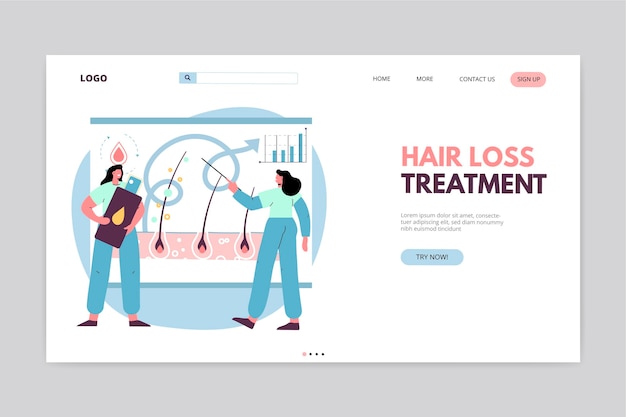
**Hair Loss: What You Should Know**
Most people lose about 50 to 100 hairs daily, and this is considered normal. When washing your hair, the number can rise to about 250 strands. However, if you notice more significant hair loss from your scalp or other parts of your body, you may be facing a condition called alopecia, commonly known as hair loss.
**How Hair Grows**
Hair typically grows about half an inch per month. About 90% of your hair is actively growing at any given time, while the remaining 10% is in a resting phase and eventually falls out.
**When Does Hair Loss Become a Problem?**
You might have a hair loss issue if you consistently wake up to find large amounts of hair on your pillow or notice more strands in your hairbrush than usual. For men, this often leads to a receding hairline at the forehead or crown. For women, the hair tends to thin, particularly along the part, making the scalp more visible. Sometimes, excessive hair loss can signal an underlying medical issue that requires attention.
**Common Reasons for Hair Loss**
There are many causes of hair loss, including:
– Genetics
– Stress
– Health conditions (like anemia, autoimmune diseases, or thyroid issues)
– Chemotherapy
– Scalp infections
– Skin conditions (like psoriasis or dermatitis)
– Pregnancy
– Hairstyles that pull on the hair
– Certain medications
– Menopause
– Hair-pulling disorder
– Poor diet or mineral deficiencies
– Illness
– Pollution
**Simple Ways to Prevent Hair Loss**
1. **Limit Hair Damage**
Hairstyling tools like dryers, curling irons, and straighteners weaken hair proteins, making hair brittle and prone to breaking. Frequent use of these devices and chemical treatments can worsen hair loss. It’s best to minimize heating tools and avoid using harsh chemicals frequently.
2. **Avoid Overusing Chemicals and Bleach**
Excessive use of hair dyes, bleach, and similar products can severely damage hair. Dyes should be limited to every 4-6 weeks, and bleaching can strip hair of its natural pigment, leaving it weak and vulnerable to falling out.
3. **Be Careful with Hairstyles**
Tight hairstyles like ponytails, cornrows, and braids can strain your hair and lead to traction alopecia (hair loss caused by pulling). Opt for looser styles to reduce hair stress.
4. **Use Mild Shampoo**
Washing your hair is important for maintaining a clean scalp and preventing infections, but washing too often may strip your hair of natural oils. Choose a mild shampoo with ingredients like sultaines, amphoacetate, or sulfosuccinates. Good conditioners should include moisturizing elements like silicones or guar.
5. **Scalp Massage**
Massaging your scalp with nourishing oils like coconut, almond, or rosemary stimulates blood flow to the hair follicles, encouraging healthy growth and reducing damage.
6. **Maintain a Balanced Diet**
A healthy diet rich in particular nutrients can help reduce hair loss:
– **Iron:** Found in red meat, broccoli, chicken, and kale, iron helps deliver nutrients to your hair follicles.
– **Protein:** Essential for strong hair, protein can be sourced from meat, seafood, eggs, tofu, and peanut butter.
– **Vitamin C:** Boosts collagen and helps with iron absorption. Foods like citrus fruits, tomatoes, and berries are excellent sources.
– **Omega-3 Fatty Acids:** Found in fish like salmon and nuts like walnuts, these fats keep your scalp hydrated and hair healthy.
– **Biotin:** A B vitamin that supports hair strength, biotin is found in foods like egg whites, soy flour, and walnuts.
7. **Try Natural Remedies**
– **Onion Juice:** Applying onion juice to your scalp overnight and rinsing it out in the morning can reduce hair loss.
– **Green Tea:** Rinse your hair with cooled green tea for an hour before washing to nourish the scalp.
– **Amla (Indian Gooseberry):** Use amla in hair masks, or consume it in your diet to keep hair healthy.
– **Coconut Milk:** Massage coconut milk into your scalp weekly to nourish your hair.
– **Neem or Aloe Vera:** Boiled neem leaves or aloe vera gel can help soothe scalp dryness and irritation.
8. **Avoid Pollution**
Protect your hair from dust, heat, and pollution by wearing a scarf or using hair oils to shield against environmental damage.
**Conclusion**
Hair loss is a common issue, but with the right care and solutions, you can protect and improve the health of your hair. By adopting proper styling habits, eating a nutrient-rich diet, and using natural or preventive remedies, you can minimize hair fall and keep your hair in excellent condition. Healthy hair is essential for overall well-being, so take these steps to nurture your locks!